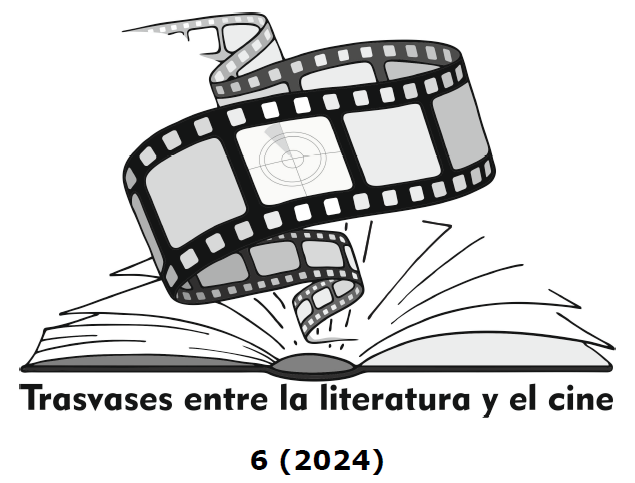The Spanish postwar in rural western terms
the film adaptations of Intemperie (2019) and Sordo (2018)
DOI:
https://doi.org/10.24310/tlc.6.2024.20108Keywords:
Adaptations, Western, Historical memory, Rurality, Intemperie, SordoAbstract
Contemporary Spanish cinema on historical memory has renewed its models with techniques and motifs of westerns. Two notable cases are the adaptations of Sordo (Alfonso Cortés-Cavanillas, 2018) and Intemperie (Benito Zambrano, 2019). In this way, the comic by David Muñoz and Rayco Pulido (2008), about a soldier in Operation Reconquista, become a sort of chase between gunmen through the Pyrenees. Meanwhile, the film based on Intemperie by Jesús Carrasco (2013) will set its plot in post-war Andalusia to offer a reflection on the subalternity and violence during Franco’s regime . In the following, we will analyse the combination of these two recognisable structures for the audience, and their formal consequences.
Downloads
Metrics
Publication Facts
Reviewer profiles N/A
Author statements
Indexed in
-
—
- Academic society
- N/A
- Publisher
- Universidad de Málaga
References
ADORNO, Theodor y Max HORKHEIMER, (1998), Dialéctica de la Ilustración. Fragmentos filosóficos, Madrid, Trotta.
ASENSI PÉREZ, Manuel (2009), «De los usos del canon: el canon por venir y el Lazarillo desfigurado», Signa. Revista de la Asociación Española de Semiótica, 18, págs. 45-68.
ALTHUSSER, Louis (1974), Ideología y aparatos represivos de Estado, Buenos Aires, Nueva Visión.
BADAL, Marc (2019), Vidas a la intemperie: nostalgias y prejuicios del mundo campesino, Logroño, Pepitas de Calabaza.
BAUMAN, Zygmunt (2017), Retrotopía, Barcelona, Paidós.
BERMEJO, Andrés G. (2019), «Sordo», 20 minutos, 9 de septiembre, s. pág. [En línea: https://www.20minutos.es/cinemania/criticas/sordo-135549/. Fecha de consulta: 23/04/2024].
CARRASCO, Jesús (2013), Intemperie, Barcelona, Seix Barral.
CAWELTI, John (1999), The Six-Gun Mystique Sequel, Madiso, University of Wisconsin Press.
CHAMPEAU, Geneviève (2018), «La novela neorrural actual entre distopía y retro-utopía», Hispanismes. Revue de la Société des Hispanistes Français, 11, págs. 1-16.
CHARLO, Ramón (2020), «José Mallorquí, su influencia en la literatura popular», Belphégor. Littératures populaires et culture médiatique, 18-2, págs. 1-11.
DÍEZ COBO, Rosa María (2017), «Páramos humanos: retóricas del espacio vacío en La lluvia amarilla, de Julio Llamazares, y en la novela neorrural española», Siglo XXI, literatura y cultura española, 15, págs. 13-25.
EFE (2019), «Intemperie, de Benito Zambrano, un western profundamente español», La Vanguardia, 9 de noviembre, s. pág. [En línea: https://www.lavanguardia.com/vida/20191109/471472217059/intemperie-de-benito-zambrano-un-western-profundamente-espanol.html. Fecha de consulta: 23/04/2024].
GÓMEZ TRUEBA, Teresa (2022), «Desmontando algunos sobreentendidos en torno al neorruralismo y la novela», en T. Gómez Trueba (ed.), La alargada sombra de Delibes sobre la España vacía: de la novela rural al neorruralismo del siglo XXI, Valladolid, Universidad de Valladolid, págs. 7-21.
GUHA, Ranajit (1988), «On some Aspects og the Historiography of Colonial India», en R. Guha y G. C. Spivak (eds.), Selected Subaltern Studies, Nueva York y Oxford, Oxford University Press, págs. 37-44.
GUTIÉRREZ RECACHA, Pedro (2004), «Pioneros en nuevas praderas (hacia una definición de un western puramente español)», Secuencias. Revista de historia del cine, 19, págs. 71-87.
GUTIÉRREZ RECHACA, Pedro (2006), «Spanish Western! La década que el cine del Oeste habló en español», Ars medica. Revista de humanidades, 5-2, págs. 267-273.
IEHL, Dominique (1997), Le Grotesque, París, Presses Universitaires de France.
KITSES, Jim (2004), Horizons West, Londres, BFI.
LÓPEZ FERNÁNDEZ, Álvaro, Gómez, Diana y Almar, Ana (2018), «Toledo bien podría ser Arkansas, o Texas. Una entrevista con el autor español Jesús Carrasco», Pterodáctilo, s. pág. [En línea: https://www.pterodactilo.com/toledo-bien-podria-ser-arkansas-o-texas-una-entrevista-con-el-autor-espanol-jesus-carrasco/. Fecha de consulta: 23/04/2024].
MARGENOT III, John B. (2017), « Traversing the Intermezzo: Demonic Archetypes in Jesús Carrasco's Intemperie», Symposium: A Quarterly Journal in Modern Literatures, 71-4, págs. 218-228.
MARTÍN BAENA, Lucía (2019), «Intemperie, un western pata negra», La Sexta, 25 de noviembre, s. pág. [En línea: https://www.lasexta.com/ahoraqueleo/virales/intemperie-un-western-pata-negra_201911255ddc144c0cf22013adf81524.html. Fecha de consulta: 23/04/2024].
MARTÍNEZ, Luis (2019), «Sordo: la guerra civil como western y crepúsculo», El Mundo, 12 de septiembre, s. pág. [En línea: https://www.elmundo.es/metropoli/cine/2019/09/12/5d79f953fdddff980a8b4590.html. Fecha de consulta: 23/04/2024].
MOLINO, Sergio del (2016), La España vacía. Viaje por un país que nunca fue, Madrid, Turner.
MORA, Vicente Luis (2018), «Líneas de fuga neorrurales de la literatura española contemporánea», Tropelías: Revista de teoría de la literatura y literatura comparada, 4 (extra), págs. 198-221.
MORALES CARRIÓ, Mari Trini (2016), El arte de los cartelistas españoles de la posguerra. De 1940 a 1980, Universidad de Granada [Tesis Doctoral].
MUÑOZ, David y Rayco PULIDO (2018), Sordo, Bilbao, Astiberri Ediciones.
PERIS BLANES, Jaume (2011), «Hubo un tiempo no tan lejano… Relatos y estéticas de la memoria e ideología de la reconciliación en España», 452º F: Revista de teoría de la literatura y literatura comparada, 4, págs. 35-55.
REY, Javier (2016), Intemperie, Barcelona, Planeta.
ROAS, David (2009), «Poe y lo grotesco moderno», 452ºF. Revista de teoría de la literatura y literatura comparada, 1, págs. 15-27.
SPIVAK, Gayatri Chakravorty (2009), ¿Pueden hablar los subalternos?, Barcelona, MACBA.
Downloads
Published
How to Cite
License
Copyright (c) 2024 Álvaro López Fernández, Raúl Molina Gil

This work is licensed under a Creative Commons Attribution-NonCommercial-ShareAlike 4.0 International License.
All authors published in this journal accept the following copyright terms:
a. Authors retain their authors´ rights (copyright) and grant First Publication Rights to the journal, which whill be published under a the Creative Commons Attribution-NonCommercial-ShareAlike 4.0 International (CC BY-NC-SA 4.0) license. All about this license is available in the following link: <http://creativecommons.org/licenses/by-nc-sa/4.0>
b. Authors may separately establish additional agreements for the non-exclusive distribution of the version of the work published in the journal (e.g. including it in an institutional repository, or publishing it in a book) with an acknowledgement of its initial publication in this journal.
c. Authors are allowed and encouraged to disseminate their work electronically (e.g. in institutional repositories or on their own website) as this can lead to productive exchanges, as well as earlier and more extensive citation of published work.
The author is responsible for obtaining permission from the copyright holder when using copyrighted materials.
This electronic journal is published by University of Málaga (UmaEditorial), thus it is necessary to cite the origin of any partial or total reproduction.








22.png)










